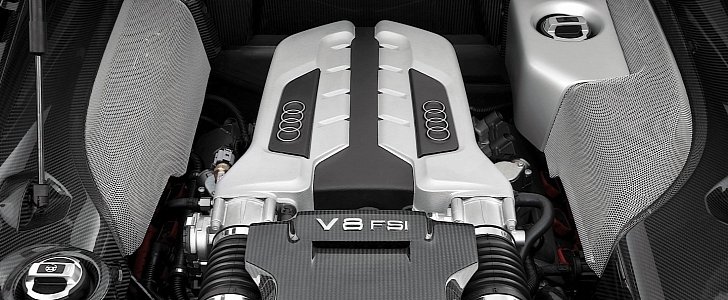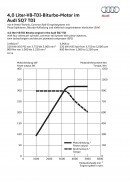Audi’s all-new V8 unit, developed for use within the Volkswagen Group, will not have a successor. The V8 engine family designed by the German automaker will not be replaced once its lifecycle is over. Since we are talking about a new unit, which is being introduced into several model ranges, Audi will keep making and improving it for about a decade.
However, when the slated lifecycle of the 4.0-liter V8 unit from Audi reaches its deadline, the automaker will not have another engine of this kind in its range.
The decision is linked to investment costs related to the development of a V8 unit in 2025, which will have to comply with even stricter emission standards, and prospective sales will not justify its existence.
Currently, the V8 unit developed by Audi is planned to be used in Porsche and Bentley models, along with the Audi SQ7, and other models from the Ingolstadt brand.
The V8 engine family from Audi will be available in both diesel and gasoline versions, and it is compatible with electric supercharging and hybrid systems. Audi’s leaders plan to build more battery-electric vehicles in the future, with a goal of 25 to 35% of 2025’s output to use this propulsion solution.
Instead of developing new V8 units a decade from now, Audi will invest in new hybrid, plug-in hybrid, and electric drive solutions. The decision was explained by a source inside the German company to the Brits at Autocar. It is easy to understand why the Ingolstadt brand might want to ditch V8 power in 2025 or earlier, as this kind of engine does not achieve massive sales figures and is hard to outweigh concerning CO2 emissions.
As you know, the European Union will force automakers to comply with an average emission target for their ranges, and it is pretty strict. Engines with large displacements and high cylinder counts are not great performers when considering their emission figures, so this kind of propulsion option could be removed from the company’s portfolio in less than a decade from today.
The decision is linked to investment costs related to the development of a V8 unit in 2025, which will have to comply with even stricter emission standards, and prospective sales will not justify its existence.
Currently, the V8 unit developed by Audi is planned to be used in Porsche and Bentley models, along with the Audi SQ7, and other models from the Ingolstadt brand.
The V8 engine family from Audi will be available in both diesel and gasoline versions, and it is compatible with electric supercharging and hybrid systems. Audi’s leaders plan to build more battery-electric vehicles in the future, with a goal of 25 to 35% of 2025’s output to use this propulsion solution.
Instead of developing new V8 units a decade from now, Audi will invest in new hybrid, plug-in hybrid, and electric drive solutions. The decision was explained by a source inside the German company to the Brits at Autocar. It is easy to understand why the Ingolstadt brand might want to ditch V8 power in 2025 or earlier, as this kind of engine does not achieve massive sales figures and is hard to outweigh concerning CO2 emissions.
As you know, the European Union will force automakers to comply with an average emission target for their ranges, and it is pretty strict. Engines with large displacements and high cylinder counts are not great performers when considering their emission figures, so this kind of propulsion option could be removed from the company’s portfolio in less than a decade from today.




